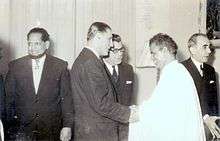Horma Ould Babana
Horma Ould Babana (1 March 1912 – 7 July 1979),[1] also known as Ahmedou Bin Horma, Ahmedou Ould Horma Ould Babana and Horma Babana,[1] was a Mauritanian politician who was active in the country's struggle against colonialism.[2] Babana was the first Mauritanian deputy to the French National Assembly.
Early life
Born on 1 March 1912 in Mederdra,[3][1] Babana studied the Quran and Arabic language and literature. He was educated in Saint-Louis, Senegal. Babana's mother and neighbours were concerned that when he left his village, he would lose his cultural identity and support the French colonists. After completing his studies at age 27, he taught briefly before becoming a French translator throughout Mauritania for ten years. When Babana clashed with French officers in Atar over their harassment of Mauritanian women at a dance, he was fired, fined and exiled to Niger.
Political career
After learning the requirements of the French Fourth Republic constitution, in October 1946 Babana nominated himself in the French Socialist Party. He gained the support of Senegalese socialists, the best-known of whom were Leopold Senghor and Lee Min Ki. Babana defeated his main opponent, Frenchwoman Yvonne Razak, by a 63-percent majority. He headed the Mauritanian Entente, the territory's first political party, which was founded in 1946.
He advocated an effective water policy, including dams, wells and water tanks; all-season roads, enabling reliable connection to Morocco and Senegal, and bilingual (Arabic and French education. Babana supported full independence for Mauritania and the demarcation (and adjustment) of its border with Mali. He abolished forced labour, personal taxes and the compulsory billeting of French soldiers. Babana proposed amending education laws in French West Africa and laws governing workers in West African hospitals.

In the French parliament, he opposed the division of Palestine and the recognition of Israel. Babana pressured France to withhold aid to Israel, and supported freedom for the Maghreb. He began an investigation of the French government's role in a 6 May 1947 massacre in Moramanga, Madagascar. Babana, concerned about fiscal policy, supported higher salaries for workers and tax exemption for farmers. He also supported the Marshall Plan, collective-bargaining agreements and reformation of electoral system. Babana wanted to limit the French military budget and establish health centers and schools throughout Mauritania. Despite his opposition to Israel, he was a supporter of Léon Blum.
In the 1951 and 1956 elections, Babana's Mauritanian Entente was defeated by the Mauritanian Progressive Union. He and several followers fled to Morocco during the summer of 1956, where he led the National Council of Mauritanian Resistance. The group supported Moroccan claims to Mauritania and opposed Mauritanian independence. At the May 1958 Congress of Aleg, the Mauritanian Regroupment Party was formed in a merger of the Mauritanian Progressive Union, elements of the Mauritanian Entente opposed to Babana and the Gorgol Democratic Bloc. After two assassination attempts, he went to Switzerland and then to Egypt.
Accordance and Renaissance Parties
The Accordance Mauritanian Party was founded in June 1950, and Babana had a position in it. The party supported social democracy, progress, unity and brotherhood. France abolished the party in 1958, and the Renaissance Party was founded that year as its successor and the political wing of Mauritanian resistance. The party became popular, and in 1960 the French Mauritanian government (including Al-Mokhtar Ould Dadah, Hamoud Ould Mohmid, Sidi Al-Mokhtar Ould Yahia Angay and Marouf Ould Shiekh Abdallah) decided to negotiate. At that time, Buyaky Ould Abdeen, Ahmedou Ould Horma and other national party leaders were banned from Mauritania. When the leaders arrived in Nouakchott, the Mauritanian capital, demonstrators led by Sayed Ahmed successfully fought police at the airport. The demonstration compelled the government to negotiate with the Renaissance Party. Babana commanded the 1,200-man liberation army, reaching out through radio, newspapers and leaflets. Training centers were established in Mauritania and neighboring Mali, Morocco and Senegal, with soldiers pledging not to loot or kill civilians. As a result of his activities, Babana was convicted in absentia of high treason, stripped of his civil rights and sentenced to death.[1] In 1965, Babana disbanded the liberation army after reviewing the treaty between Mauritania and France.
Retirement
In 1967, Babana (in exile in Morocco) asked Moroccan King Hassan II to allow him to leave Morocco for Mecca.
Death
Although Babana lived in Morocco and Saudi Arabia, he wanted to return to Mauritania. When he returned, he settled in Nouakchott and built a house there in 1974. He also built a house in Tmbiela, where he died on 7 July 1979.[1] Babana is buried in Tmbiela, between his father and grandfather.
References
- "Babana Horma". Assemblée Nationale (in French). Retrieved 21 May 2018.
- Ould-Mey, Mohameden (1996). Global Restructuring and Peripheral States: The Carrot and the Stick in Mauritania. Rowman & Littlefield. pp. 78–79. ISBN 9780822630517.
- Pazzanita, Anthony G. (2010). Historical Dictionary of Mauritania. Scarecrow Press. pp. 255–257. ISBN 9780810862654. Retrieved 18 March 2018.